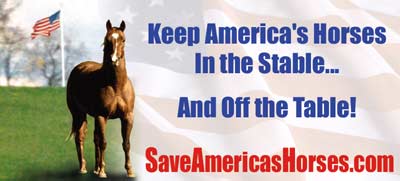
Horse Slaughter
FAQ's
Facts
Slaughter Stats
Public Opinion Polls
Press
What You Can Do!
About
Who We Are
Our Horses
Support/Donations
Merchandise
Contact Us:
Links
California Voters "Just Say Neigh" to Horse Slaughter!
HoofPAC
Equine Protection Network
Shop online at IGive.com with over 400 great stores you know & love- including Back In the Saddle! Up to 26% of the purchase price is donated to the EPN!
Join today!The EPN gets $5 extra the first time you shop!
PayPal accepts credit cards! Please send your tax deductible donation to the:Equine Protection Network, Inc.,
P. O. Box 232, Friedensburg, PA, 17933.
HoofPAC is the political action committee that has been formed to end the slaughter of America's horses. Cathleen Doyle, founder of HoofPAC, led the successful Save The Horses campaign in 1998 that made the slaughter of California's horses a felony.
Did You Know?
"The draft horse industry is a major player in the horse meat market and each one of us should carefully analyze the proposed law and the effect it will have on our future."..
Kenneth C. Sandoe, in the Draft Horse Journal, Summer 2003
Page last revised on:


Frequently Asked Questions on Horse Slaughter
The Pro Slaughter Argument
HoofPAC Rebuttal to the Pro Slaughter Arguments
Pro slaughter argument: Horse slaughter is a personal choice.
As a country and culture, Americans have mandated social policy to not slaughter or eat animals that we have domesticated, i.e., dogs, cats, horses.
Pro slaughter argument: Horse slaughter sets the floor for the price of all horses.
Those that are working toward protecting all American horses both wild and domesticated against being cruelly slaughtered care more about the horses welfare than 'setting the floor' for horse dealers.
Pro slaughter argument: What are we supposed to do with all the horses?
There is an alternative and it's been around for decades...it's called humane euthanasia by lethal injection, and it will require that you call your veterinarian out and put your horses down humanely.
Pro slaughter argument: If slaughter is made illegal, more horses will starve to death in people's backyard or will be abandoned.
Horse slaughter is a for profit industry driven by dealers and agents. It has nothing to do with the pathology of neglect or cruelty. Horse slaughter is legal today every where but the State of California, and we still have neglect. There is no correlation between neglect and slaughter, and pro slaughter proponents cannot produce any studies or stats to substantiate this very flimsy argument.
Pro slaughter argument: Slaughter is humane.
Slaughter is cruel and inhumane and cannot be regulated into being humane. Responsible horsemen, whenever necessary, call out their vet and have their animals humanely euthanized.
Pro slaughter argument: Who are we to tell other people what to eat?
The vast majority of right minded Americans who oppose horse slaughter are not dictating the eating habits of any other culture. Rather, we are, and have a constitutional right to, protect our recreational and pleasure animals against the foreign meat markets.
Horse slaughter is the economic underpinning and subsidy for irresponsible breeding, horse theft, PMU factory farming of horses and its by product foal genocide, and the extermination of our wild horses.
If we want a more responsible horse community, we must remove the incentive and 'prize' for irresponsible behavior...the breed em, trash em and can em...go buy or breed another horse crowd.
Those that support horse slaughter have been identified and their motives are clear. They are driven purely by the dollar...and are looking for that return on their salvage investment, and want to keep a conduit in place that will alleviate the necessity of paying the vet to put down their horses. Sorry humane euthanasia goes with the territory. If you can afford to own a horse, you can afford to put them down humanely when the time comes.
Cathleen Doyle
HoofPAC
Pro slaughter forces argue that:
If Slaughter is Outlawed, More Horses Will be Neglected & Starve in People's Backyards
Starvation is a long slow process. Owners who starve their horses do not one day decide to no longer feed and water their horses. If they did so, the horse would be dead within a week from dehydration. Instead the process is often tied to the seasons. The horses get fat in the summer when there is plenty of grass and then during the winter or periods of drought, the horses drop weight.
Cruelty officers state that owners of neglected horses often make the statement,
"I love my horse."
- In their experience cruelty officers have found that these people do not want to give up ownership of their "beloved" horse.
- Upon inspection of the premises, law enforcement officers often discover that the owners have a myriad of other problems including child abuse, domestic violence, substance abuse and an overall problem with the maintenance of the property.
- There are no facts or statistics to prove the claim that slaughter prevents the starvation of horses.
- Horse slaughter is legal.
- Horses are still starving, proven by the fact that these horses show up at horse auctions and cruelty officers receive complaints regarding starving horses, even though slaughter is legal.
- The starving of horses is illegal.
- Enforcement of anti-cruelty laws would prevent starvation more efficiently than slaughter.
- Owners who send their starving horses to slaughter are not punished for their cruel behavior.
- Slaughter rewards negligent owners with money for bad behavior.
- Emaciated and starving horses purchased at auctions have died within one day from starvation.
 The option of slaughter did not prevent the horse's owner from starving the horse within days of dying. The process can take weeks, months, or years. The horse is suffering during this time. The option of sending the horse to slaughter is not preventing the owner from neglecting the horse.
The option of slaughter did not prevent the horse's owner from starving the horse within days of dying. The process can take weeks, months, or years. The horse is suffering during this time. The option of sending the horse to slaughter is not preventing the owner from neglecting the horse.
Enforcement of anti-cruelty laws and education will do more to prevent horses from starving to death in owners' backyards than will the option of horse slaughter.
Pro slaughter forces argue that:
Cost of euthanasia and carcass removal is prohibitive to some horse owners.
- Horses are not inexpensive animals to own.
- The cost of euthanasia is tied to the cost of living in each geographic area.
- The cost of euthanasia is part of horse ownership.
- The cost of euthanasia and removal of the carcass is comparative to the cost of a new set of shoes.
- Horses require new shoes every 4 to 6 weeks.
- If owners cannot afford euthanasia, than owners cannot afford a horse.
- Horses become sick or injured must be treated
- Horses that are treated with medications are not to be slaughtered for human consumption.
- Allowing a sick, injured, and or dying horse to suffer is against anti-cruelty statutes.
- The owner is required by law to treat the horse humanely. By not euthanizing the horse, the owner is breaking the law.
Disposal of the Body
- Horses die all the time and owners are able to remove the body either by burial, rendering, cremation, or disposal in a landfill.
- Owners of horses that die due to colic, a leading killer of horses, are able to dispose of the body. Owners do not tell their vets not to euthanise the horse that is dying of colic because they do not know how to dispose of the body. The horse is dying, whether the owner chooses to euthanise or not. Either way the owner is going to have to remove the body.
- Denying a colicing horse necessary vet care is a violation of the anti-cruelty laws.
- If the horse has already been treated with medications, it is illegal to send the horse to slaughter.
- The horse may not live until the horse reaches the slaughterhouse. Horse slaughterhouses only exist in Texas and Canada.
- Building horse slaughterhouses in every state to eliminate the collection and transportation of the horses long distances is not feasible. Americans do not eat horsemeat. There is no demand for horsemeat in this country.
- The law prohibits horses from being slaughtered in the same slaughterhouse as cattle, hogs or sheep.
- No raw material and no demand for the final product make it economically impossible to have horse slaughterhouses located in every state.
Responsible owners do not starve or abandon their horses, whether slaughter is legal or illegal. By stating that if slaughter became illegal, owners would starve their horses, is to embrace the theory that responsible people would now break the law by starving their horses because they could not, or would not pay $50.00 to $400.00 to have their horse euthanised and the carcass removed.
Allows the owner some return on the animal or "salvage value"
To allow an inhumane and socially unacceptable practice to continue simply because a small handful of Americans want to be allowed to make money is unacceptable. The amount of money that is spent by owners on their horses, and then to make a statement that they must get the last $200 - $400.00 out of the horse is disgusting.
Is it appropriate for Americans to legislate what the rest of the world should eat.
Culture determines a society's laws. Culture determines what people eat. It is an affront to American culture to eat a horse, a dog, or a cat. We are not telling other countries what to eat, we are just telling them they cannot eat American horses!
Save America's Horses! |
|||||||
|
Please send your tax deductible donation to: Equine Protection Network, Inc., P. O. Box 232, Friedensburg, PA, 17933 |
||
Save America's Horses- Make the Commitment to Your Horse! |
||
|
Photos On This Page CANNOT be Used Without Written Permission
|
||
